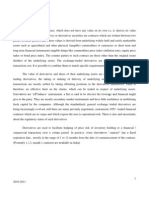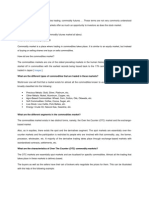Derivatives
Uploaded by
hibahnadeem84Derivatives
Uploaded by
hibahnadeem84What are Types of Deriva琀椀ves? What is ‘Commodity Exchange’? What is meant by ‘Commodity’?
Forwards: A forward contract is a customized contract between two en琀椀琀椀es, where se琀琀lement takes
place on a speci昀椀c date in the future at today’s pre-agreed price. Futures: A futures contract is an
agreement between two par琀椀es to buy or sell an asset at a certain 琀椀me in the future at a certain price.
Futures contracts are special types of forward contracts in the sense that the former are standardized
exchange-traded contracts, such as futures of the Ni昀琀y index. Op琀椀ons: An Op琀椀on is a contract which
gives the right, but not an obliga琀椀on, to buy or sell the underlying at a stated date and at a stated price.
While a buyer of an op琀椀on pays the premium and buys the right to exercise his op琀椀on, the writer of
an op琀椀on is the one who receives the op琀椀on premium and therefore obliged to sell/buy the asset if
the buyer exercises it on him. Op琀椀ons are of two types - Calls and Puts op琀椀ons: ‘Calls’ give the buyer
the right but not the obliga琀椀on to buy a given quan琀椀ty of the underlying asset, at a given price on or
before a given future date. ‘Puts’ give the buyer the right, but not the obliga琀椀on to sell a given quan琀椀ty
of underlying asset at a given price on or before a given future date. Presently, at NSE futures and
op琀椀ons are traded on the Ni昀琀y, CNX IT, BANK Ni昀琀y and 116 single stocks. Warrants: Op琀椀ons generally
have lives of up to one year. The majority of op琀椀ons traded on exchanges have maximum maturity of
nine months. Longer dated op琀椀ons are called Warrants and are generally traded over-the-counter.
What is an ‘Op琀椀on Premium’? At the 琀椀me of buying an op琀椀on contract, the buyer has to pay premium.
The premium is the price for acquiring the right to buy or sell. It is price paid by the op琀椀on buyer to
the op琀椀on seller for acquiring the right to buy or sell. Op琀椀on premiums are always paid upfront. A
Commodity Exchange is an associa琀椀on, or a company of any other body corporate organizing futures
trading in commodi琀椀es. In a wider sense, it is taken to include any organized market place where trade
is routed through one mechanism, allowing e昀昀ec琀椀ve compe琀椀琀椀on among buyers and among sellers -
this would include auc琀椀on-type exchanges, but not wholesale markets, where trade is localized, but
e昀昀ec琀椀vely takes place through many non-related individual transac琀椀ons between di昀昀erent
permuta琀椀ons of buyers and sellers. FCRA Forward Contracts (Regula琀椀on) Act, 1952 de昀椀nes “goods” as
“every kind of movable property other than ac琀椀onable claims, money and securi琀椀es”. Futures’ trading
is organized in DERIVATIVES Chapter 5 Introduc琀椀on to Financial Markets 30 31 such goods or
commodi琀椀es as are permi琀琀ed by the Central Government. At present, all goods and products of
agricultural (including planta琀椀on), mineral and fossil origin are allowed for futures trading under the
auspices of the commodity exchanges recognized under the FCRA. Commodity deriva琀椀ves market
trade contracts for which the underlying asset is commodity. It can be an agricultural commodity like
wheat, soybeans, rapeseed, co琀琀on, etc or precious metals like gold, silver, etc. The basic concept of a
deriva琀椀ve contract remains the same whether the underlying happens to be a commodity or a 昀椀nancial
asset. However there are some features which are very peculiar to commodity deriva琀椀ve markets. In
the case of 昀椀nancial deriva琀椀ves, most of these contracts are cash se琀琀led. Even in the case of physical
se琀琀lement, 昀椀nancial assets are not bulky and do not need special facility for storage. Due to the bulky
nature of the underlying assets, physical se琀琀lement in commodity deriva琀椀ves creates the need for
warehousing. Similarly, the concept of varying quality of asset does not really exist as far as 昀椀nancial
underlyings are concerned. However in the case of commodi琀椀es, the quality of the asset underlying a
contract can vary at 琀椀mes .
You might also like
- PDF Report Jakpat Brand Health Tracking Q1 of 2019 - Instant Noodle Free Version 19047100% (1)PDF Report Jakpat Brand Health Tracking Q1 of 2019 - Instant Noodle Free Version 1904715 pages
- Unit 5 Derivatives: Mysore University MBA SyllabusNo ratings yetUnit 5 Derivatives: Mysore University MBA Syllabus37 pages
- "Future of Commodity Derivatives Trading in India" Conducted at Fortune Equity Brokers (India) LimitedNo ratings yet"Future of Commodity Derivatives Trading in India" Conducted at Fortune Equity Brokers (India) Limited67 pages
- A Study On Investor Awareness Towards Commodity Market in Karvy Stock Broking LimitedNo ratings yetA Study On Investor Awareness Towards Commodity Market in Karvy Stock Broking Limited53 pages
- A Beginners' Guide To Commodity Market (Spot and Futures)No ratings yetA Beginners' Guide To Commodity Market (Spot and Futures)47 pages
- Commodity Basics - The Financial DoctorsNo ratings yetCommodity Basics - The Financial Doctors30 pages
- Commodity Derivatives Commodity Derivatives Commodity Derivatives Commodity Derivatives Commodity DerivativesNo ratings yetCommodity Derivatives Commodity Derivatives Commodity Derivatives Commodity Derivatives Commodity Derivatives3 pages
- Module 4 - Introduction To Derivatives and Commodity Markets - StudentNo ratings yetModule 4 - Introduction To Derivatives and Commodity Markets - Student21 pages
- Commodity Market: "Advice Is The Only Commodity On The Market Where The Supply Exceeds The Demand."No ratings yetCommodity Market: "Advice Is The Only Commodity On The Market Where The Supply Exceeds The Demand."53 pages
- Commodity Market in India: An: Shiv S. ShrivastavaNo ratings yetCommodity Market in India: An: Shiv S. Shrivastava11 pages
- Commodities Market Module Work Book: Nse'S Certification in Financial MarketsNo ratings yetCommodities Market Module Work Book: Nse'S Certification in Financial Markets57 pages
- Chapter 3 - Derivative Market An OverviewNo ratings yetChapter 3 - Derivative Market An Overview38 pages
- Module 4 - Introduction to Derivatives and Commodity Markets _final(Students)No ratings yetModule 4 - Introduction to Derivatives and Commodity Markets _final(Students)19 pages
- 9 Derivatives 16 5 12 120819125650 Phpapp02No ratings yet9 Derivatives 16 5 12 120819125650 Phpapp0221 pages
- SWING TRADING OPTIONS: Maximizing Profits with Short-Term Option Strategies (2024 Guide for Beginners)From EverandSWING TRADING OPTIONS: Maximizing Profits with Short-Term Option Strategies (2024 Guide for Beginners)No ratings yet
- Business Mathematics and Statistics 1st Edition - eBook PDF instant download100% (1)Business Mathematics and Statistics 1st Edition - eBook PDF instant download61 pages
- Private Equity Resume Template and ExampleNo ratings yetPrivate Equity Resume Template and Example3 pages
- Sold Out How Marketing In School Threatens Childrens Wellbeing And Undermines Their Education Alex Molnar downloadNo ratings yetSold Out How Marketing In School Threatens Childrens Wellbeing And Undermines Their Education Alex Molnar download86 pages
- The Influence of Augmented Reality On E-Commerce A Case Study On Fashion and Beauty ProductsNo ratings yetThe Influence of Augmented Reality On E-Commerce A Case Study On Fashion and Beauty Products21 pages
- ' Chase Opportunities, Not Cash - Then Wealth Will Follow.-1No ratings yet' Chase Opportunities, Not Cash - Then Wealth Will Follow.-171 pages
- Full Download Technical Analysis Plain and Simple Charting the Markets in Your Language 2nd Edition Michael N. Kahn PDF DOCX100% (13)Full Download Technical Analysis Plain and Simple Charting the Markets in Your Language 2nd Edition Michael N. Kahn PDF DOCX67 pages

























































































